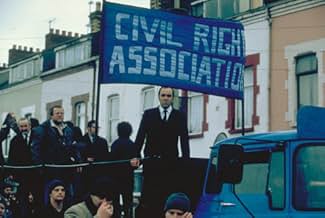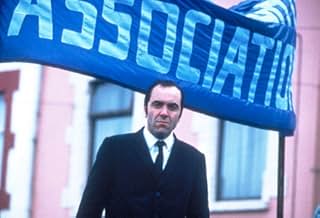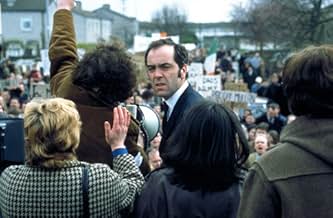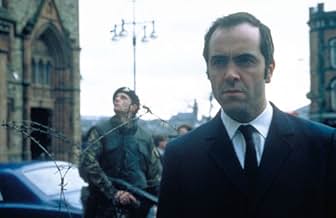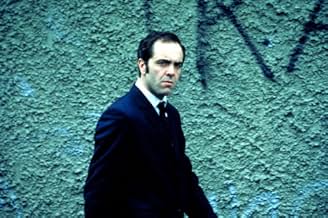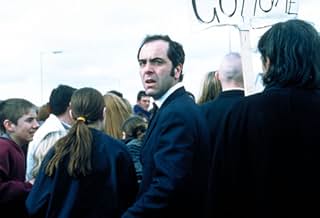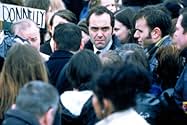Una drammatizzazione della marcia di protesta per i diritti civili irlandesi e il successivo massacro delle truppe britanniche il 30 gennaio 1972.Una drammatizzazione della marcia di protesta per i diritti civili irlandesi e il successivo massacro delle truppe britanniche il 30 gennaio 1972.Una drammatizzazione della marcia di protesta per i diritti civili irlandesi e il successivo massacro delle truppe britanniche il 30 gennaio 1972.
- Ha vinto 1 BAFTA Award
- 19 vittorie e 23 candidature totali
- Bridget Bond
- (as Carmel Mccallion)
- Maj. Steele
- (as Chris Villiers)
Recensioni in evidenza
The acting, especially James Nesbit is excellent, the recreation of the mood is superb although it was obvious with the constant close ups that there was very little budget to recreate the scenery. The geography was never explained and therefore would leave a viewer without prior knowledge of the area disorientated.
The documentary suffered from not being able to set the scene, a lot had happened in the week prior to the Civil Rights march that put both the participants and the security forces on edge and made the advance more significant. The question of why the Paras were sent to Derry were never fully explored.
Overall it was flawless recreation of events from the point of view taken by the film makers on this particular incident. It is worth noting that this is based on the Irish Governments review of the Widgery report into Bloody Sunday. (NB the Widgery report is mostly considered by nationalists to be a white wash)
The film jumps so frequently from scene to scene that at times it is distracting, though I was much less annoyed by this the second time around. And, having seen it once with and once without subtitles, I must say that although the subtitles (optional on the DVD) are intrusive they are quite welcome. I love the Irish accent but at times it can be difficult for me to decipher,and much of the dialogue in the movie is muted. It was good to know what was being said.
As for the objectivity, of course the movie is slanted - so was the situation. But it is not unreasonably slanted. The British are not shown as one-dimensional demons - in particular, Nicholas Farrell does a great job of conveying Brigadier Mclellan's ambiguity and even disapproval of the course taken against his wishes by the supposed "Observer," Maj. Gen. Ford (who, if the movie has a villain, is the prime candidate.) At one point early on several Paras are discussing the day's prospects, and reveal how tired they are of being harassed, shot at and otherwise abused by the native population. This makes the day's events more understandable. This does not EXCUSE the cold-blooded gunning down of 27 people - there is no excuse for that - but at least one can see a contributing factor. And protesters are shown, once or twice, firing back. (The key here is firing BACK - evidence indicates that no marchers fired until the first two protesters were wounded. And those scattered few that attempted return fire were quickly dissuaded by their countrymen. Later in the day the IRA did go into action, but not until after the bloodletting in Bogside was over with.) Ivan Cooper's (James Nesbitt) words at the close of the film were shown to be all too true in the years since the actual incident. The IRA was on unsteady legs at the time, but has never lacked support since January 30, 1972.
The film is a powerful object lesson concerning the misuse of force, and one that governments everywhere - including my own country, the United States - should take to heart. It has a few flaws, but I think deserves the awards it has received. 8/10 points.
Dramatising the events that led to the tragic incident on January 30, 1972, Bloody Sunday follows a civil right activist named Ivan Cooper who was the central organiser of the peaceful rally against internment that ended when British army paratroopers began firing on the unarmed demonstrators in full view of the public & the press.
Written & directed by Paul Greengrass, the movie sets its foreboding tone right within the opening segment after which it takes a step back to put its pieces on the board but once the stage is set, it explodes & moves forward with stunning immediacy. Greengrass' direction is at its very best when things go south & the whole episode is extensively detailed in the script.
Cinematography employs the quasi-documentary-style to film the entire event as it unfolds, thus bringing the viewers right into the conflict, while the frenetic hand-held camera-work further reflects the chaotic nature of such circumstances. Editing is slick for the most part, music is nearly absent and its cast contributes with convincing performances, playing their given roles with utmost sincerity.
On an overall scale, Bloody Sunday is a fiercely directed, deftly scripted, viciously photographed, skilfully edited & brilliantly performed movie that brings the dreadful event to life with remarkable precision, brims with intense emotions from start to finish, and not only works as a riveting thriller but also as an unsettling documentary. Disturbing & disquieting but essential viewing nonetheless, Bloody Sunday is strongly recommended.
But for an American audience with no benefit of subtitles for the brogues and working class Brit accents, no explanations outside of eventual context for lingo and slang (it took me awhile to keep track of "provos" vs "paras"), the quasi-documentary, in-your-face approach takes on a tragic universality.
It could be part of a Cassandra trilogy with `Black Hawk Down' and `No Man's Land' about why military should not be in charge in urban strife, whether as "peacekeepers" or in civil wars or regime changes, no matter how heinous the regime to be changed. A lesson for the Baghdad invasion planners?
Cities are complicated social ecologies, and the film shows a great diversity of attitudes and pressures on all sides, managing to be both clinical in meticulous detail and visceral in shocking impact. The film is probably not objective about the British (I don't think it's a coincidence that the imperious Brit "observer" who takes repugnant charge is played by Tim Pigott-Smith who was a similar colonialist in `The Jewel in the Crown.") A central universal image becomes the awesome power of rock-throwing, unemployed teen-age boys to spark war.
The liberals in the middle, clinging to dreams of Gandhi, Martin Luther King, and fair community relations, are morally destroyed over the course of a few hours and the extremists with guns on both sides feed on each other in perpetual destruction like the ouroboros image of the snake eating itself. I kept feeling I missed the exact flash point in a wandering attention moment and wanted to immediately re-watch it to see if I could track the gotcha! moment when escalation could have been prevented, so I look forward to this being available on video tape.
But the film does clearly show that it was attitudes that created the violent outcome and consequent government non-investigation, as we see in so many police situations. Once soldiers enter a city it is a police situation with all those complexities.
I know James Nesbitt primarily from frothy Irish comedies, like `BallykissAngel,' so his staggering portrayal of the M.P. in the middle is a revelation, as he goes from planning a civil rights march to pleading with his girlfriend to physical heroism to a break-down in shock.
The version of the titular U2 song played out at the end, running well past the credits finish, is a moving, live, passionate audience sing-along where Bono shouts out other locales that have experienced similar situations to emphasize the universality.
Lo sapevi?
- QuizTo make this movie as authentic as possible, no lights were used in the movie and the camera work was entirely hand-held
- BlooperThe marchers carry homemade cardboard signs with slogans written on them. When shown from behind, some have modern printing ("Made in China") on them that are not appropriate for 1972.
- Citazioni
Ivan Cooper: I just want to say this to the British Government... You know what you've just done, don't you? You've destroyed the civil rights movement, and you've given the IRA the biggest victory it will ever have. All over this city tonight, young men... boys will be joining the IRA, and you will reap a whirlwind.
- Curiosità sui creditiThe live rendition of U2's Sunday, Bloody Sunday continues to play for a full three minutes over a black screen after the credits finish rolling.
- ConnessioniFeatured in The 2003 IFP Independent Spirit Awards (2003)
I più visti
Dettagli
- Data di uscita
- Paesi di origine
- Lingua
- Celebre anche come
- Domingo sangriento
- Luoghi delle riprese
- Aziende produttrici
- Vedi altri crediti dell’azienda su IMDbPro
Botteghino
- Budget
- 2.000.000 £ (previsto)
- Lordo Stati Uniti e Canada
- 773.228 USD
- Fine settimana di apertura Stati Uniti e Canada
- 29.419 USD
- 6 ott 2002
- Lordo in tutto il mondo
- 1.758.689 USD
- Tempo di esecuzione
- 1h 51min(111 min)
- Colore
- Mix di suoni
- Proporzioni
- 1.85 : 1

